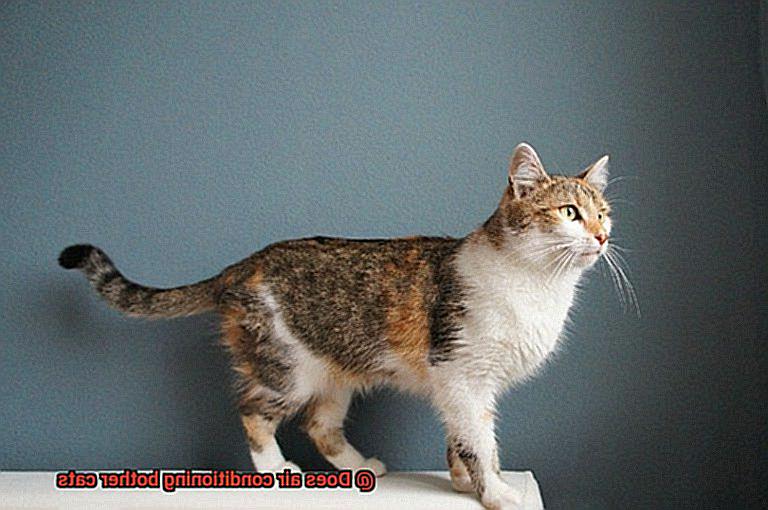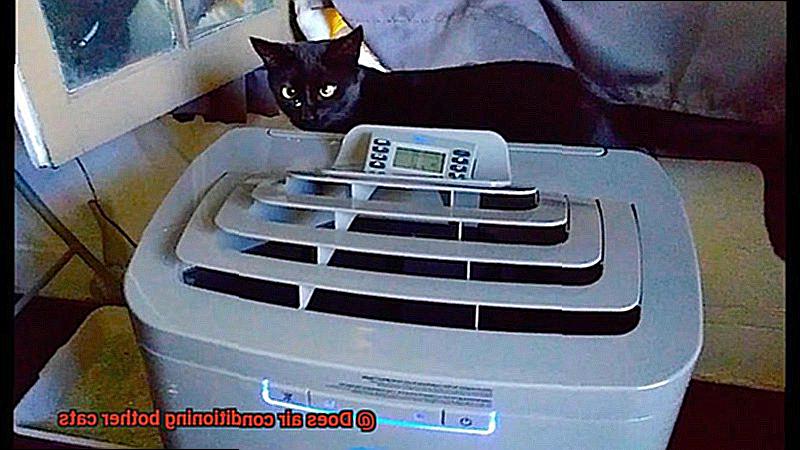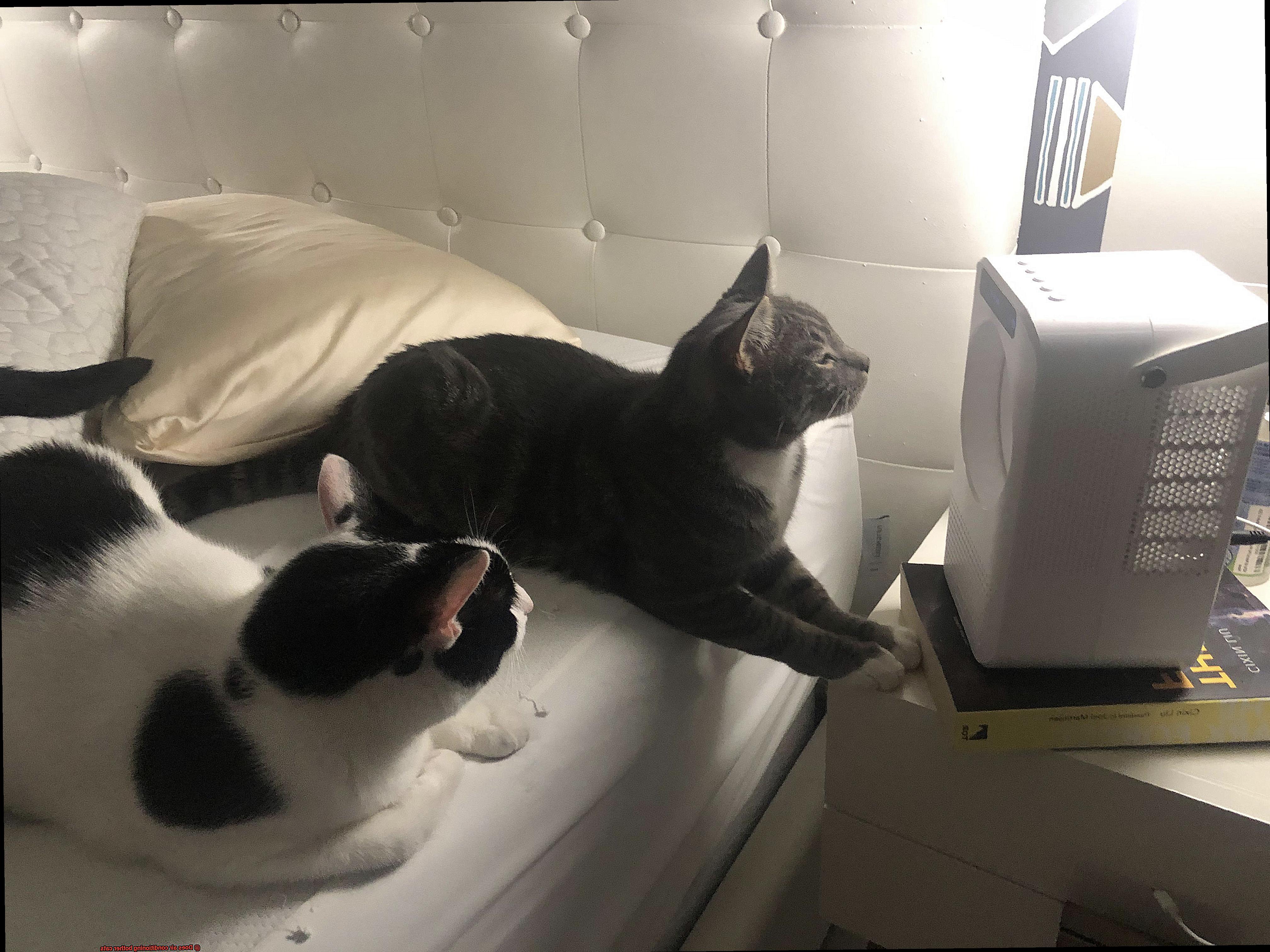Cats are fascinating creatures, and as pet owners, we want to provide them with the best possible life. We make sure they have access to food, water, a clean litter box, and a safe environment. However, with the summer heatwave in full swing, many of us turn to air conditioning for relief. But what about our feline friends? Does air conditioning bother cats?
This is a question that has puzzled cat owners for years. Some cats may be more sensitive to temperature changes than others and may not appreciate the cool breeze blowing on them. In this blog post, we’ll delve into whether air conditioning truly bothers cats or not. We’ll also explore ways to make your feline friend more comfortable and when it’s time to seek professional help if your cat seems unhappy or unwell.
We’ll also discuss common signs that your cat may be uncomfortable in an air-conditioned house such as excessive grooming, hiding or vocalizing. Additionally, we’ll examine whether air conditioning can cause health problems for cats such as respiratory issues, dehydration or even hypothermia.
By the end of this post, you’ll have a better understanding of how air conditioning affects cats and how you can keep them happy and healthy during the hot summer months.
So, let’s dive in now.
How Air Conditioning Affects Cats
Air conditioning can have both positive and negative effects on cats, so it’s crucial to understand how it can affect them.
Cats are sensitive creatures and can be affected by changes in temperature just like humans. However, they have different mechanisms for regulating their body temperature, and they may not react the same way as humans to environmental changes such as air conditioning.
One of the primary ways that air conditioning affects cats is through changes in humidity levels. When the air conditioner is running, it can remove moisture from the air, leading to dry skin and eyes for both cats and humans. Cats may also experience respiratory problems if the air is too dry, particularly if they have pre-existing conditions such as asthma. Therefore, it’s vital to keep your air conditioning system well-maintained and clean by changing the filters frequently and having it inspected annually.
Another factor to consider is the noise level of the air conditioner. Cats have sensitive ears and may be bothered by loud or high-pitched noises emitted by the air conditioner. This can cause stress and anxiety for some cats, leading to behavioral changes such as hiding or avoiding certain areas of the home. To address this issue, consider choosing a quieter unit or providing your cat with a quieter sleeping area away from the air conditioning noise.
Finally, it’s important to note that cats have different preferences when it comes to temperature. While most cats prefer a warm environment, some may enjoy cooler temperatures during hot weather or if they have a thick coat of fur. It’s crucial to observe your cat’s behavior and adjust the air conditioning accordingly to ensure their comfort.
Potential Issues with Air Conditioning
As the temperature rises, we often turn to our trusty air conditioning units for relief. While these machines can be a lifesaver for us humans, they may pose potential issues for our feline friends.
Cats are more sensitive to temperature changes than humans, and sudden drops in temperature caused by AC units can cause discomfort for them. This is especially true since cats have a natural preference for warmer temperatures due to their higher body temperature. So while we feel cooled off and refreshed, our cats may be feeling chilly and uncomfortable.

Another issue with air conditioning is that it can dry out the air in your home. This can lead to dry skin and respiratory problems for your cat, particularly if they spend a lot of time indoors where the air is likely to be more stagnant and dry. To combat this issue, it’s essential to keep your home well-ventilated and consider using a humidifier in the room where your cat spends most of their time.
Additionally, air conditioning units can be noisy and disruptive to cats, especially if they’re located near your cat’s favorite resting spot. Cats are creatures of habit, and sudden changes in their environment can cause anxiety and stress.
To alleviate this issue, consider placing your AC unit in a location that’s away from your cat’s favorite sleeping areas or investing in a quieter unit that won’t disturb their peace and quiet.
The Role of Temperature and Humidity
Yes, their average body temperature is about 101.5°F, which means they may not tolerate cold temperatures as well as humans do.
But that’s not all – cats are also highly sensitive to changes in humidity levels. Low humidity can cause dry skin and respiratory problems, while high humidity can lead to mold growth and other health issues. Therefore, it’s crucial to maintain a comfortable temperature and humidity level for your beloved furry friend.
So what is the ideal temperature and humidity level for your cat? Well, the sweet spot is typically around 78-80°F with a humidity range of 40-60%. This way, your cat stays cozy without getting too hot or too cold.
But that’s not all – you can make your cat even more comfortable by providing them with a warm place to rest, such as a heated bed or blanket. This will keep them snug and happy, especially if the air conditioning makes the room too chilly.
It’s also essential to pay attention to your cat’s behavior. If they seem uncomfortable or exhibit signs of respiratory issues, like sneezing or coughing, it could indicate that the air conditioning is bothering them. In such cases, it’s best to adjust the temperature or humidity levels or consult with a veterinarian for further advice.

Dry Skin and Respiratory Problems
As summer approaches, we all want to find ways to stay cool and comfortable in the sweltering heat. However, it’s important to keep in mind that our furry feline friends can suffer from air conditioning just as much as humans do. In fact, air conditioning can lead to dry skin and respiratory problems in cats, causing discomfort and potential health issues.
The dryness caused by air conditioning can result in flaky and itchy skin, leading to excessive grooming and even hair loss. This is especially concerning for cats with pre-existing skin conditions, as the dryness caused by air conditioning can exacerbate their symptoms. Moreover, cats exposed to air conditioning for prolonged periods may develop respiratory issues as the cold and dry air irritates their respiratory tract, causing coughing, wheezing, and difficulty breathing. This is particularly alarming for cats with pre-existing respiratory issues such as asthma.
To prevent these issues, it’s crucial to maintain a comfortable temperature in your home for both you and your feline companion. Keep the temperature between 78-80°F and humidity levels between 40-60% for optimal health benefits. Additionally, using a humidifier can help add moisture to the air and prevent dry skin and respiratory problems in cats.
Noise from the Air Conditioner
If your air conditioner is causing distress due to its noise, there are solutions to alleviate the situation.
Cats have sensitive ears that can pick up sounds that humans can’t. The compressor in your air conditioner is often the source of the noise that may be bothering your cat. It’s essential to take this seriously and make changes to reduce the discomfort.
To start, try relocating your cat’s bed or sleeping spot away from the air conditioner. This will create physical distance between your cat and the source of the noise. Additionally, using noise-cancelling curtains or blankets can help block out the sound.

If these measures don’t work, consider upgrading to a quieter air conditioner model. Many newer models are designed with noise reduction in mind and come equipped with features like sound-dampening insulation and low-noise compressors.
Remember to pay close attention to your cat’s behavior when the air conditioner is running. If you notice that they seem bothered or stressed by the noise, taking steps to reduce the sound level is crucial for their comfort.
Taking Necessary Precautions
When it comes to summer, air conditioning can be a lifesaver for both you and your cat. However, there are some necessary precautions you need to take to ensure their safety and comfort.
The first and most important precaution is maintaining a comfortable temperature for your cat. While cats are adaptable, extreme temperatures can make them uncomfortable. It’s best to set the AC at a temperature that is suitable for both you and your feline friend, and avoid constantly adjusting it.
Dry air from the AC can also cause dehydration in cats. To prevent this, make sure your cat has access to multiple sources of fresh water throughout the house. You might want to consider using a cat fountain or adding wet food to their diet to increase their water intake.
Moreover, some cats may be more sensitive to the sound or feeling of cool air blowing on them. If you notice any signs of discomfort or distress, such as hiding or changes in their behavior or appetite, it may be necessary to adjust the temperature or provide alternative cooling methods.
Regular maintenance of your AC unit is crucial not only for your cat’s comfort but also for their health. Dirty filters and ducts can lead to poor air quality and respiratory issues for both humans and pets. Therefore, scheduling regular cleanings and inspections is vital to keep your AC running smoothly and ensure your home is free from harmful pollutants.
9ZF8F7XbrqA” >
Conclusion
To sum it up, air conditioning can have both positive and negative impacts on cats. Some felines may be more sensitive to temperature changes than others, so it’s important to pay attention to their behavior and understand how AC affects them. Changes in humidity levels and noise from the unit can cause discomfort and potential health issues for our furry friends.
Prolonged exposure to air conditioning can lead to dry skin and respiratory problems. To prevent this, maintain a comfortable temperature between 78-80°F with humidity levels between 40-60%, use a humidifier, and always provide fresh water.
Noise from the AC can also cause stress and anxiety for some cats. Consider relocating their bed or investing in a quieter unit to help alleviate this issue.
To ensure your cat’s comfort and health during hot summer months, take necessary precautions such as regular maintenance of the AC unit, scheduling cleanings and inspections, providing alternative cooling methods if needed, and monitoring your cat’s behavior.
By understanding how air conditioning affects cats, we can ensure they have a happy and healthy life. So keep your AC well-maintained, maintain a comfortable temperature and humidity level for your cat, and pay attention to their needs.







